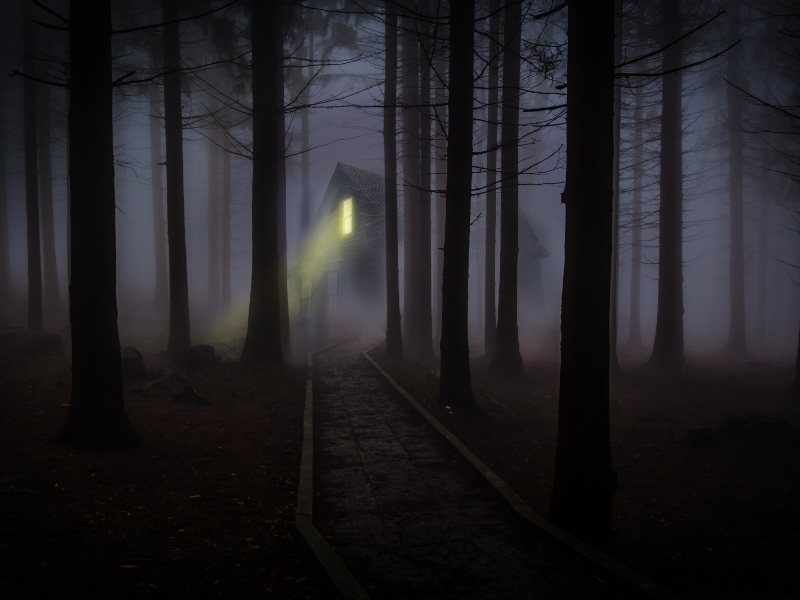Social Links Widget
Click here to edit the Social Media Links settings. This text will not be visible on the front end.
Buyer Beware: Is That House For Sale Haunted?

A trope as old as horror movies: a family moves into a beautiful house that they bought for well under market value. They’ve put all their savings into the move, and they’re looking for a fresh start. When they meet the neighbors and other townsfolk, they quickly learn that there’s a history to the home that they weren’t aware of.
When they start to experience the abnormal, it’s easy to brush off as new home jitters. The children who hear noises in the closet, and a husband who starts sleepwalking, are chalked up to stress and anxiety from the move. It’s only when the experiences escalate beyond control that the family finally realizes the extent of the haunting.
While sharing a home with the supernatural can be a selling point for some buyers, it’s quite the opposite for others. In fact, a 2017 survey by Realtor.com found that 33% of people were open to living in a haunted house, 25% would consider it, but 42% said it was a deal-breaker. So how do you make sure you’re fully informed about a home’s history? Knowing the right questions to ask is the first step:
Ask to see the seller disclosure form
In the famous 1991 case Stambovsky v. Ackley, the new homeowner, Jeffrey Stambovsky, won a lawsuit against the previous owner for not disclosing the history of hauntings.
In this case, the previous owner had published stories about the family’s experiences in Reader’s Digest and their local newspaper. In her writings, she explained several interactions with ghostly beings in the home, including finding that her children had been given rings, which would later disappear, bed shaking, and conversations with the floating specters.
The court took this evidence and ruled the “defendant is estopped to deny [the ghost’s] existence and, as a matter of law, the house is haunted.” Setting a new standard, this case created a basis for future seller disclosers. In this instance, they found that the history of the home, and the seller’s experiences in the home, would have influenced the marketability, and therefore, omitting these facts was unfair to the buyer.
Fast forward to 2019, there is not a specific section on seller disclosure forms for hauntings or ghostly sightings, but thanks to Stambovsky v. Ackley, sellers in many states are obligated by law to disclose things that affect a house’s marketability.
Ask Google about the history of the home
In 1991 when Mr. Stambovsky bought his haunted house, search engines didn’t exist. Today, we’re lucky enough to have things like Google which would have found the previous home owner’s stories in mere seconds. Search keywords like the address or town name, and words like “haunted” or “ghosts”, as well as “murder” or “news report” should help you start your dive into the history of the home.
Ask the neighbors and your agent
This is where nosey neighbors come in handy. When you find a place you’re serious about, contact the neighbors to see what they know about the home’s history. The same goes for your real estate agent; he or she can reach out to the listing agent to see if there is anything haunting you should know about prior to buying. While many states don’t require sellers to disclose paranormal activity or deaths in the home, if asked, all real estate agents must, by law, answer truthfully.
The Risks and Rewards of Purchasing a Bank-Owned Home


The process of purchasing a home directly from a lender can be long and arduous, but could very well be worth it in the end. If you have your sights on a particular home or are looking to find a deal on your first, working directly with the lender may be your only option. Purchasing a bank-owned home is not for the faint of heart, here are some tips for negotiating the REO process:
1. Be prepared: The condition of bank-owned properties are often poor and hard to show. Past owners may have departed on bad terms, leaving the home in poor condition with foul smells, missing appliances, wires taken from breakers, gas fireplaces gone, even bathrooms without toilets and sinks.
2. Understand the costs: Maintenance or repairs may be necessary, since these homes have been vacant for an unknown period of time–sometimes months or years. Keep in mind, when they were occupied the owners could have been under a financial hardship, preventing them from doing regular seasonal care or repairs when needed. Remember as well that the bank is trying to sell the house immediately, so you will receive a financial break in the price rather than a willingness to negotiate on the maintenance and repair issues.
3. Accept the unknown: In traditional real estate transactions, homeowners fill out Form 17 regarding important information about the history of the house. A bank owned home is either exempt or marked with “I don’t know” throughout the document. Not having the accuracy of this 5-page disclosure form could leave you with a lot of unanswered questions on the history of the home.
4. Know what is non-negotiable: The pricing on the house may not get much lower. Some of these properties can be “a dream come true” if you get them at an amazing price, or they could be your worst nightmare. Do your due diligence researching any property, and conduct all necessary inspections to safeguard yourself. Some major repairs may be negotiable, but will likely not reduce the home price.
5. Make a clean offer: The higher the price you can offer, the better. Include your earnest money, keep contingencies to a minimum, and suggest a reasonable closing date. The simpler your offer is, the higher chance you have of the bank accepting your offer or countering in a reasonable time period.
6. Be patient: Consult with a professional who handles bank owned home purchases to help you negotiate the pathway to homeownership. The process of purchasing a bank-owned, foreclosed or short-sale home is typically longer than a typical real estate sale.
 Facebook
Facebook
 Twitter
Twitter
 Pinterest
Pinterest
 Copy Link
Copy Link
